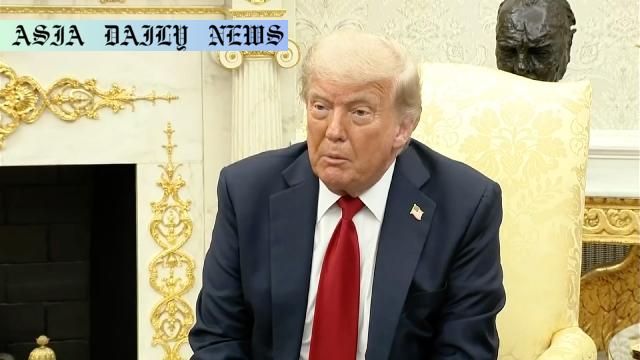Trump expresses disappointment but insists on action against Russia amid Ukraine conflict and a firm 50-day negotiation freeze.
- Trump criticized Putin for continued aggression in Ukraine.
- The US President announced a 50-day deadline for progress.
- Economic and military pressure key to negotiation table.

Trump Expresses Disappointment in Putin Over Ukraine Actions
On Monday, US President Donald Trump openly criticized Russian President Vladimir Putin in an interview with the BBC, expressing his disappointment over continued attacks on Ukraine amidst stalling peace talks. Trump’s remarks came as he announced the United States’ decision to escalate its military and economic efforts to counter Russia’s actions through NATO cooperation. This includes supplying more weapons to Ukraine and levying severe tariffs should Russia fail to engage in meaningful negotiations with Ukraine within the next 50 days.
Trump stated, “I thought we had a deal done four times and then you go home and you see he just attacked a nursing home or something in Kyiv. I said what the hell was that all about.” His candid criticism reflects growing frustration within US leadership over Russia’s apparent unwillingness to de-escalate the conflict. Trump’s comments highlight the complex and deteriorating relationship between his administration and Russia amid one of Europe’s most volatile geopolitical conflicts in recent history.
Economic Pressure and Military Coordination with NATO
A major aspect of Trump’s strategy to handle the crisis involves coupling economic sanctions with enhanced military support for Ukraine. This strategy aligns with recommendations from US-based think tanks like the Institute for the Study of War, which emphasize that a combination of economic and military leverage is essential to bring Putin to the negotiation table.
By working closely with NATO allies, the United States aims to ensure Ukraine’s defensive capabilities remain intact and fortified against further aggression. The recent arms shipments represent a clear signal that the Western coalition remains committed to defending Ukrainian sovereignty. However, this dual strategy of carrots and sticks—offering room for negotiations while threatening further economic consequences—has also drawn criticism, particularly from Russian politicians such as Leonid Slutsky, who argues the focus should shift away from Russia and onto Ukraine’s leadership.
Challenges to Progress in Ukraine Talks
Despite Trump’s firm stance, numerous challenges remain in achieving tangible progress. Diplomatically, past negotiations have been marred by mistrust, with agreements often falling apart due to renewed hostilities. Trump’s decision to impose a strict 50-day deadline for a resolution is an attempt to lock both sides into a definitive framework for progress. The White House is banking on economic sanctions, a proven pressure mechanism, coupled with increased military aid as a means to destabilize Russia’s prolonged aggression.
For the people of Ukraine, the ongoing conflict continues to wreak havoc on civilian lives, infrastructure, and the nation’s economy. The direct targeting of civilian areas, such as nursing homes mentioned by Trump, is further exacerbating global outcry against Russia’s tactics. However, Moscow’s continued defiance suggests that strict deadlines and increased Western measures might escalate tensions before resolving them.
Conclusion: A Test for Geopolitical Diplomacy
President Trump’s bold approach underscores his administration’s focus on combining economic and military measures to pressure Moscow into action. However, balancing this approach with diplomatic efforts remains a crucial and arduous task. As the situation unfolds, the international community will continue to watch closely, hoping for a resolution that can restore stability in the region without escalating into a broader conflict.



Commentary
The Complexity of US-Russia Relations Amid the Ukraine Crisis
The ongoing diplomatic dance between the United States and Russia is emblematic of a larger geopolitical struggle that has unfolded over the past few years. President Trump’s recent remarks about his disappointment in Putin serve as a clear indication of his administration’s frustration over the lack of meaningful progress on negotiations concerning Ukraine. This underlying tension highlights the growing divide not only between the two nations but also within the broader international community.
Trump’s decision to impose tariffs and deadlines as pressure tactics is an unconventional yet characteristic move that aligns with his broader economic and political philosophy. While this approach has found support among NATO allies, it also risks escalating the situation further. The coupling of military aid with economic sanctions sends a strong message but also creates a precarious balancing act in times of sensitive diplomacy. The long-term efficacy of this strategy is uncertain, particularly given Russia’s history of defiance under sanctions and external pressure.
Is Escalation Inevitable or Avoidable?
The larger question looming over these developments is whether escalation—militarily or economically—is inevitable. Trump’s frustration over stalled agreements reflects the difficulty of negotiating with a state actor like Russia, which has historically managed to operate on its terms largely due to its economic and military prowess. With a strict deadline in place, the risk of miscalculations or outright defiance increases, potentially bringing about new and unintended consequences.
Nonetheless, Trump’s approach also demonstrates resolve, signaling that the United States is unwilling to abandon Ukraine. Providing military support ensures that Ukraine remains capable of defending itself, while economic sanctions highlight the West’s continued commitment to penalize Russia for its actions. Whether this approach will yield the desired results or exacerbate tensions remains to be seen. What is clear, however, is that the global diplomatic community faces a defining moment in navigating this prolonged crisis.